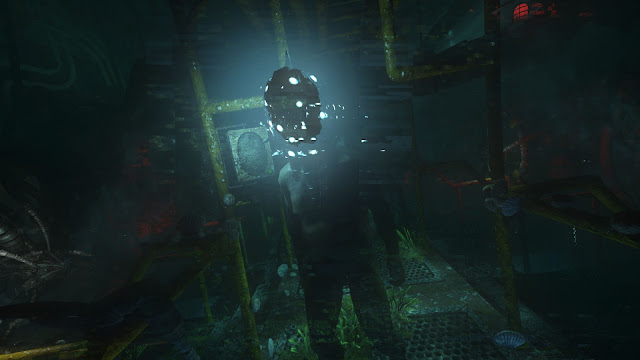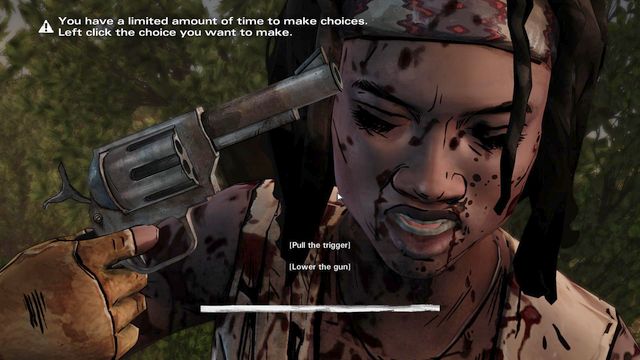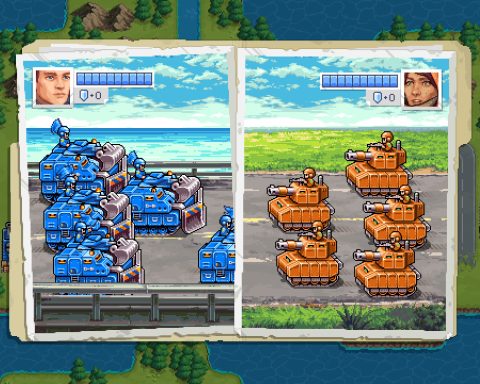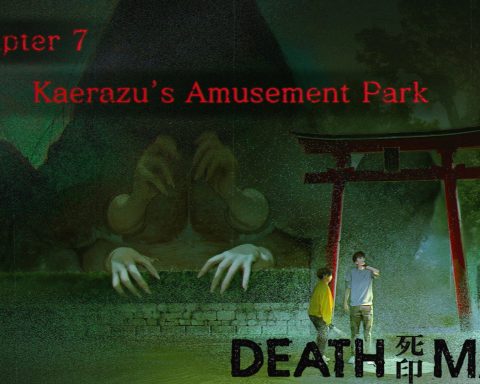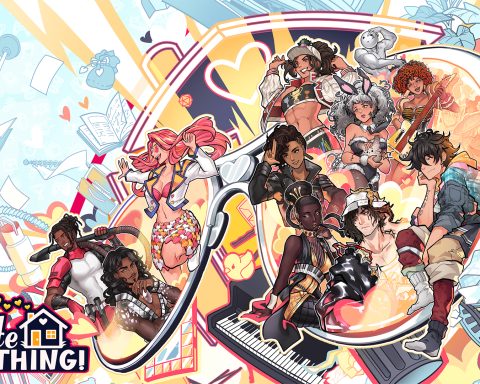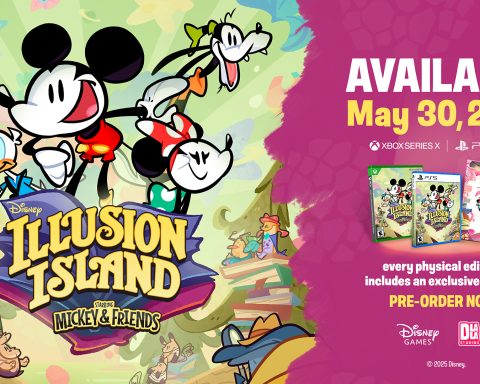Opinion by Matt C.
In the ongoing push for more open, player-driven game stories, we’re seeing more and more focus on “meaningful choices” – or, more often than not, criticism of games for presenting choices that aren’t “meaningful”. This is something I see frequently, especially in response to games like Telltale’s where dialogue choices are central to the experience, and it highlights what I think is a very narrow and limitation definition of “meaning” in games discourse: that it wholly and exclusively relates to narrative outcomes.
Consequences are, of course, an important aspect of dialogue and moral choices, but they’re not what gives a decision meaning. Rather, they’re a means to an end – meaning comes from the act of making a choice, and consequences are just one of many ways to inform those decisions.
Case in point: how often do you know the outcome of a choice you’re about to make? In games that have a clear-cut moral divide, like Mass Effect, “good” and “evil” choices may be marked, giving you some idea, but for so many games, moral ambiguity is the order of the day. Not knowing the outcomes is what makes such quandaries work, because you’re forced to try and predict and anticipate what will happen. The actual outcome has no bearing on your decision making; it’s your perception of what could or should happen that informs your choice. Yes, the consequences of past decisions may factor into this, and games can dilute the decision-making process by giving too much of a glimpse behind the “illusion of choice”, but this is just one piece of contextual information.
Consider, for example, one early choice in The Walking Dead: Season One: in the midst of a zombie attack, you can try to save either Shawn Greene or Duck, but not both. In practice, the choice has little impact on the plot, beyond a slight change in Kenny’s feelings toward Lee; either way, Shawn dies, and Hershel Greene kicks you off his farm. But when you don’t know that, it’s a really difficult choice: save the guy who went out on a limb, trusted you, and invited you to take refuge in his home, or a kid who might be a little bit annoying, but quite obviously means the world to his parents? The actual outcome is inconsequential; the decision is driven entirely by your relationship to these characters and what you anticipate will happen as a result of your choice.
Throughout the rest of The Walking Dead, there are dozens of such choices that are ultimately inconsequential, but are deeply meaningful – that meaning comes from what you want or expect to happen, not from what actually does.
The context in which a choice is made is so important to its meaningfulness, to the point that even these perceived outcomes don’t necessarily matter because there are other factors at play. At one point in the second episode of Life is Strange, you’re prompted to make a choice about what to order for breakfast: a bacon omelette or Belgian waffles. Beyond just being inconsequential, it’s a choice that would be completely banal and pointless in any other game.
So often, the weight of a choice comes from the high stakes at work, but one of the great strengths of Life is Strange is its ability to hit the pause button and capture the mundanity of everyday life; this choice of breakfast foods captures that wonderfully. The actual outcome certainly doesn’t matter, and for most people, the perceived outcome wouldn’t either, but in the context of Life is Strange and the themes it explores, there’s meaning in the act of making even as a relatively dull a choice as this. (Personally, I agonised over this, because I love both omelettes and waffles so damn much.)
To flip that example on its head, consider the first major dilemma of The Walking Dead: Michonne: whether or not to the pull the trigger when Michonne is holding a gun to her head. Like Life is Strange’s breakfast choice, there’s little weight to outcomes – actual or perceived – in this scenario, because it’s obvious that pulling the trigger won’t result in Michonne’s death. After all, it’s the first episode in a three-part series that takes place prior to issues of the comic that feature Michonne. But again, the act of making the choice is incredibly weighty, because it speaks volumes about the characterisation of Michonne and the player’s relationship with her.
The first time I played, I chose not to pull the trigger – why would I? Sure, Michonne was clearly struggling to cope with the loss of her children, but was it something to kill herself over? I thought not. But since playing the game in full and getting to know Michonne in that context, pulling the trigger is, for me, the only option. For Michonne as I know her, in the headspace that she’s in at that point in time, pulling the trigger is the right choice – the only choice – for her. It won’t affect much, plot-wise, but it’s rife with meaning and weight because of how it relates to Michonne’s character arc.
You could argue here that the choice should have come later, after players have had time to get to know Michonne and to give the choice that weight the first time through, but I’d argue that the timing, as it is, is also incredibly important. The final choice in Michonne mirrors the first one in a way that’s hard to ignore, putting that initial decision into reflective context that adds so much weight. It’s precisely because it’s so seemingly meaningless that, when looking back (or playing again), the choice to pull the trigger becomes so meaningful.
SOMA might the best example of all: within a strictly linear plot, moral choices have no consequences whatsoever – other than those you imagine. It’s said that no monster can be as scary as the ones in your head, and this goes for SOMA’s brand of existential terror, too. This is a game that goes to great lengths to make you question your notion of what it means to be human, and then puts you in a position to be judge, jury, and executioner when it comes to the humanity of others.
Is an AI cloned from a human personality, but living inside a robotic body, human? What about one cloned from your own personality, or one within a body that combines robotic and organic matter? SOMA asks the fundamental question: “what makes us human?”, then makes you answer it by choosing whether or not to kill beings that may or may not be human. With no effect on the narrative and no consequences to tell you if you did the right or wrong thing, you’re left to wallow on your own imagined consequences, which will be far more disturbing – and meaningful – than something that could be pre-written.
Sometimes, the most meaningful choice is the one that you don’t get to make. I’ve never finished Spec Ops: The Line, and a big part of that is that I reached a point where it became too emotionally challenging to continue – “the only winning move is not to play”, and all that. As a game meant to critique and deconstruct the glorification of war seen in so many other military shooters, this is precisely the point. It’s a game where progress so often relies on you doing terrible things to people who don’t deserve it, and try as you might, you have no option but to do these things if you want to forge ahead. Playing it, I wanted nothing more than to be able to be the hero and make the “good” choice – to save the innocent, to punish the villainous – but that choice wasn’t there. Spec Ops: The Line’s whole thematic structure relies on purposely denying players those options.
When it’s not giving you the most open-ended choices of all, SOMA does a similar thing. There are points in that game where progress means doing something awful, like when you desperately need spare parts that can only be obtained by tearing apart a strange and cute little robot that’s gone out of its way to help you a number of times prior. It’s a horrible, heartbreaking moment, but as with Spec Ops: The Line, the only other option is to stop playing. You don’t get a choice, and that denial of control makes a powerful statement, especially when you consider how this empathy with something that is unquestionably not human ties into the wider themes of the game.
All of this discussion around “meaningful choices”, and what that phrase actually means, ultimately ties into a much bigger debate around the dichotomy of player agency and authored narrative in games. One of the defining aspects of games as an artistic medium is the involvement of the audience, but there seems to be a growing perspective that this means that players should always be the directors of the story and that there’s no place for linear, authored tales (see, for example, Warren Spector’s criticisms of Uncharted and The Walking Dead).
To put it bluntly, this is ridiculous. Storytelling is one of the oldest staples of human culture, and there’s always been a combination of authorial intent and audience involvement. The latter encompasses everything from subjective interpretation of a static, linear text to a direct line of influence on how the story plays out. There’s nothing unique about video games in this regard other than the mechanics by which the audience engages with the work, and there’s space for everything from the most strictly linear, authored games to the most open-ended and player-directed.
The notion that the only meaningful choice is one that directly and significantly affects the plot ties into that same idea that the only valid game is one where player agency within the story is tantamount. Choices can be as much a tool for driving empathy with a prescribed story as they can be a way of putting players in the director’s chair, and decision-making used for that effect can be just as meaningful.
Conversely, consequences that are shoehorned in to force some sense of player agency can be detrimental to the meaning and impact of a story as a whole. The final episode of The Wolf Among Us spent so much time running through a checklist of choices made throughout the game (“Aha! You say one thing, but remember that time you did the other thing?”) in an effort to force late-game meaning on earlier choices that it never gets a chance to create an interesting and compelling villain, leaving an otherwise great series to end on a really flat note.
Life is Strange did a similar thing by ending on a massive, world-changing binary choice that would have been excellent if not for the fact that there was a very obvious “correct” choice that was well developed and thematically consistent with the game, and an alternative that felt hollow and pointless. As someone who wholeheartedly and knowingly chose the “bad” ending (and I would do so every time), the game ended on a terribly anticlimactic note, like this ending was an afterthought – a way to tick off the “player agency!” box.
The ironic thing is that the “good” ending would have been so much more meaningful without that choice. The game ultimately about the inevitability of fate, giving players the option of turning their back on destiny by opting to save Chloe undermines that. More to the point, being forced into making the “right” decision, even when I didn’t want to, would have driven that theme home in such a meaningful way – you can’t escape fate, so as much as you may wish for something else to happen, this is the ending you get.
It’s a difficult balance to get right, and it’s easy to fall into the trap of too much player agency, undermining the story being told to the player, and too little, diluting the player’s role within the story. But, every now and then, a game will get it just right.
Tales from the Borderlands is one such game. There’s plenty going on, but at the heart of the game is a love story between two super cute robots, and this will play out as it does regardless of the choices you make throughout the game. But there is a myriad of other little subplots that you can drastically affect – the relationship between Athena and Springs, Rhys’ flirting with Sasha and Fiona’s (dis)approval of it, whether certain characters live or die, and so on.
None of these choices have any affect on how the main plot plays out, but they do a huge, important job of pulling players into the world and allowing them to build relationships with the characters – relationships that give meaning to the events of the game, even those that you have little or no control over. The best part is that all these little choices come back to haunt you in the finale, but unlike The Wolf Among Us, it’s done in a way that is hugely gratifying and that enhances the main story rather than detracting from it.
Tales from the Borderlands captures the best of both worlds: the linear, authored narrative and the more open, player-driven one, and it combines them in a way that makes the overall package so utterly cohesive and compelling. It helps that the storytelling is top-notch, of course, but it’s remarkable to see a game that marries the two sides of the player agency and meaningful choices debate so well.
In saying that, this isn’t something every game should strive for. Some games, like The Walking Dead: Michonne and SOMA, work best when choices are used as a way of illustrating established characters and engaging players in a plot that is predetermined. Other games place a heavy aspect on player agency, and draw meaning from the consequences – both perceived and actual – of decisions that are made. But there’s place for both approaches, and indeed, video games are at their best as a storytelling medium when creators are doing both.
Outcomes are just one of many ways to instill meaning in the choices players make in a game, and the discourse around game narrative suffers when we treat it as the only one that matters. Decision-making, be it dialogue options open-ended approaches to gameplay, or any other aspect of direct player involvement, is a vital tool for game storytelling, and there is so much more to these choices than direct narrative consequences. Meaning comes, fundamentally, from the act of making the choice.
– Matt C.
Contributor


